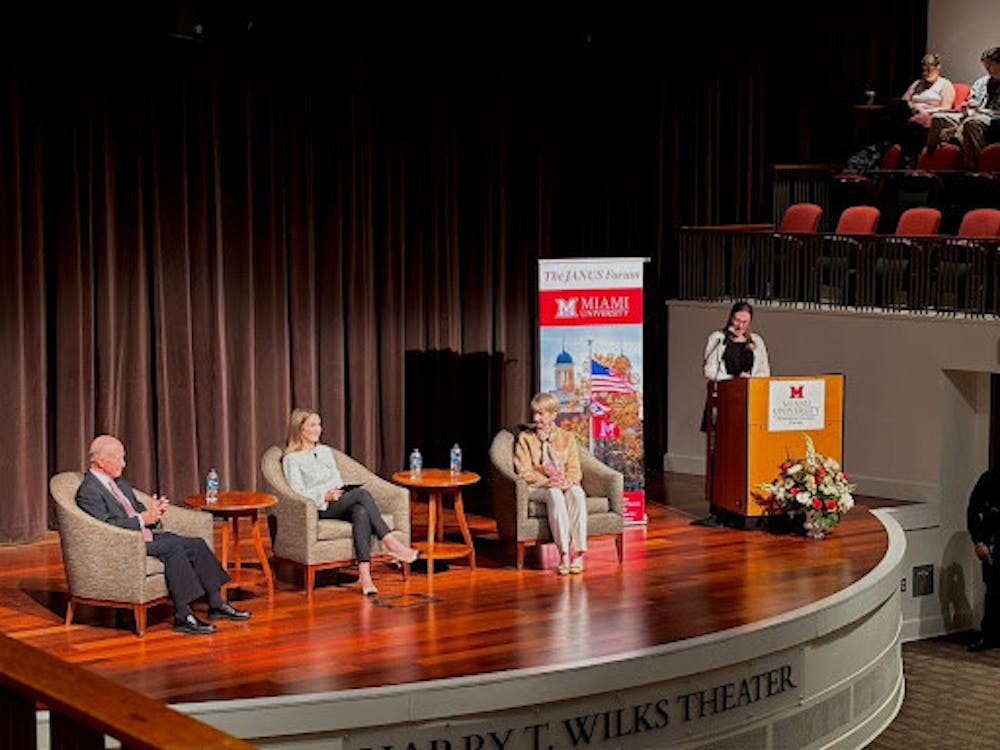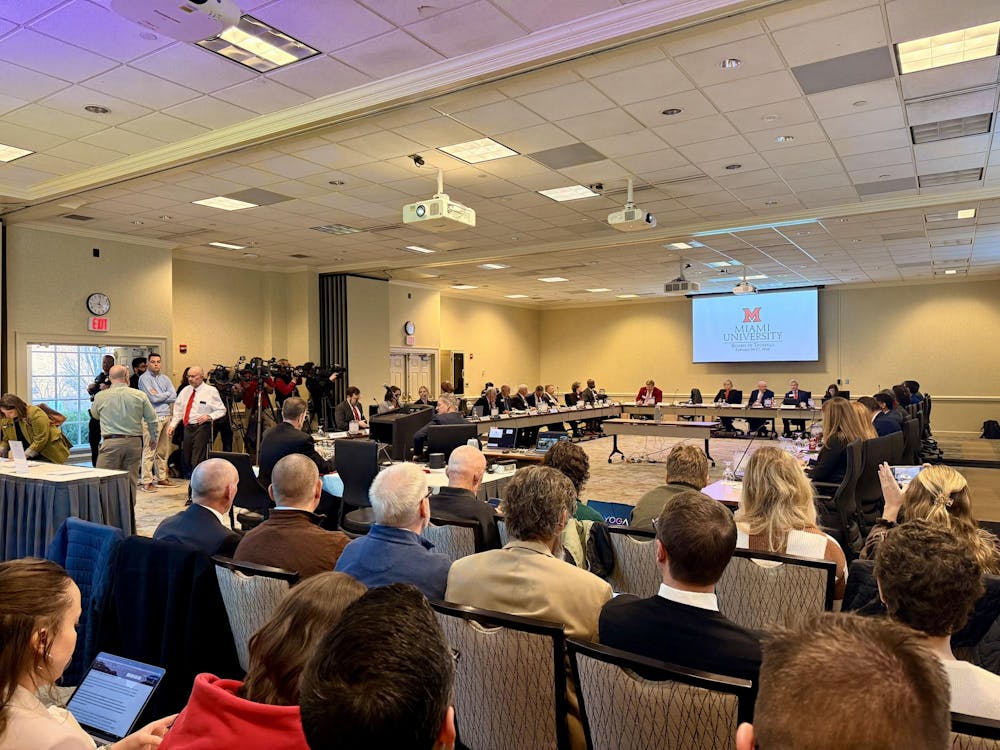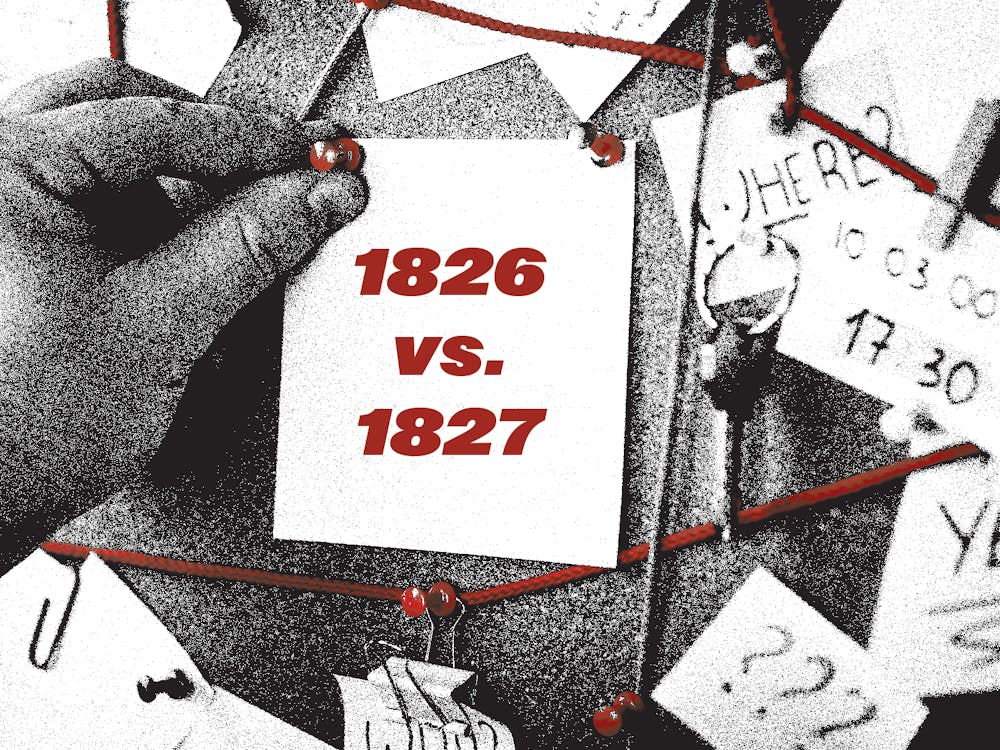On Nov. 13, Miami University’s department of political science hosted its biannual JANUS Forum in Wilks Theater in Armstrong Student Center. This semester’s topic was “Is Higher Ed Woke and Broke? The Politics and Economics of College Today.”
According to the organization’s website, the JANUS Forum “provides a place for members of the community to come together and discuss opposing views freely and passionately.” The event featured Kristina Johnson, former president of the Ohio State University (OSU) and now SUNY Chancellor, alongside Gov. Mitch Daniels, former president of Purdue University and the 49th governor of Indiana.
The forum began with a question from moderator Minnie Warfield which asked how universities can provide “constructive dialogue and understanding among students with diverse perspectives on social justice issues.” In response, Johnson referenced a quote said by Hasan Jeffries, a history professor at OSU and brother of Minority Leader Hakeem Jeffries, during a program on civil discourse.
“‘When I’m in the classroom, I’m not there to close down discussion, and I’m not there to try and indoctrinate or change students’ minds,’” Johnson said. “‘I’m there to help them develop sharper arguments for their particular position.’”
Daniels echoed a similar message.
“Our goal is to have a more balanced and diverse population [of students],” Daniels said. “But we’re most concerned, with all our students, not [about] how many come in, but how many go out and succeed and have great lives. That’s where the investments are going.”
From there, the conversation shifted to discuss Ohio’s S.B. 83, which primarily aims to limit diversity, equity and inclusion training, promote “intellectual diversity” policies and limit “controversial topics” in the classroom. The bill is currently in the House Higher Education Committee.
Though he doesn’t support the basis of the bill, Daniels did state his concern for students feeling uncomfortable to share their opinions in the classroom, especially when that opinion is part of the minority.
“In survey after survey, high percentages of students say they do feel intimidated,” Daniels said. “Maybe it wasn’t intentional on some faculty members’ part, but they do [feel intimidated], and they are very reluctant to speak.”
In her response, Johnson spoke on the importance of universities having control over their own classrooms.
“The academy should decide how the academy is run,” Johnson said. “Who teaches, what they teach, how it’s taught and to whom they teach.”
However, Johnson also expressed concern for a section of the bill that addresses equal opportunity in diverse identities. The bill establishes equal opportunity for individuals regardless of race, gender or religion. Sexual orientation, gender identity and gender expression have been eliminated from these categories in the newest version of the bill.
Enjoy what you're reading?
Signup for our newsletter
The forum also touched on the ongoing conflict in Gaza. The question posed to Daniels and Johnson asked if universities should be promoting social events on the issue and if they should endorse one side versus another.
“There’s a clear responsibility to ensure [the] safety of students,” Daniels said. “[But] I think the answer is for the university to be a convener and in a neutral place where all points of view, even those we consider deeply wrong, can be expressed.”
Johnson agreed, also touching on student safety, along with maintaining the mission of the university.
“We have to protect the mission, protect the core,” Johnson said. “So if something like that happens, what is the mission of the university’s academic freedom? It is making sure that you don’t squash debate. You’re hoping that it maintains civility, but it doesn’t always end up that way, so safety first.”
In addition to social issues, the panelists answered questions about the financial obligations required of students who want to attend colleges and universities, particularly about student loan debt. During his time at Purdue, Daniels worked to make college more financially accessible to students by freezing tuition.
“We want this place to be and remain a school where it is accessible and affordable to people of all income levels and stations in life,” Daniels said. “A much better answer would be to hold colleges and universities partly responsible for any defaults by the graduates. … If our schools had to give back some few cents on the dollar if their graduates prove unwilling to pay their debts, [it] would modify behavior in a hurry.”
In her response, Johnson referenced a program she and her wife helped start at OSU that involved alumni donations to help combat the costs of college.
“You can get them excited about coming up with a way so that you pay it forward … to help the next generation,” Johnson said. “You get [alumni] every year to pledge towards that debt free degree, so it aligned everybody around the students in the university. It was really pleasurable to see.”
The final question of the night touched on the fact that an undergraduate degree, while expensive, is often necessary for many occupations. As a result, the question was posed asking if the “American dream” is now less accessible than ever.
Daniels said he believes a college degree is less required in the professional world now.
“Whether it’s in [the] business sector, the public sector, I see people stepping back from it as an absolute requirement,” Daniels said. “The real divide is based on education levels. And that’s not healthy … We need to have mutual respect and some empathy and some tolerance for people who see things differently.”
Johnson disagreed, saying many jobs go to people with bachelor’s degrees, therefore creating the need to make higher education more accessible.
“When we go back to the facts, [in] the last decade, 15 million new jobs all went to people with a bachelor’s degree, and 3 million jobs were lost, jobs that could be held by students with only a high school diploma,” Johnson said. “I think we have to face the cold, hard facts and realize we’ve got to figure out a way we can make [education] affordable and accessible.”
The forum was attended by around 100 people. Cara Hallquist, a music composition and diplomacy and global politics major, said that though the topic of higher education among students may not be frequent, it remains to be important.
“I think it’s something that a lot of us don’t discuss a lot,” Hallquist said, “And it’s kind of important to discuss, especially in a political sense, so I thought that it was a really interesting topic.”
First-year marketing major Madie Peppo also attended the talk and found it interesting and inspiring for her future ambitions.
“I could relate to a lot of it because of the lower-income [demographic] going into college,” Peppo said. “I want to look more into how I can help support future education and less debt for students.”
The next JANUS forum will be held during the 2024 spring semester. Students interested in helping plan the next event can find more information on The Hub.




